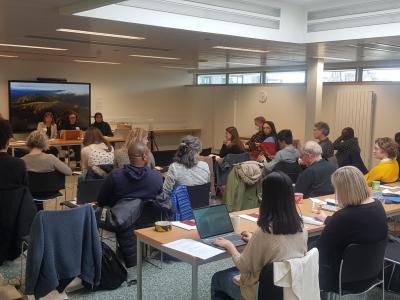
Race, Empire, and the Edinburgh Medical School
By Dr Simon Buck and Dr Ian Stewart.
On 17-18 April 2024, the University of Edinburgh (UoE) welcomed over 50 attendees to the Conference ‘Race, Empire, and the Edinburgh Medical School’, held in the Centre for Research Collections in the University Library. Organised by Drs Simon Buck and Ian Stewart, the conference was generously funded by the Institute for Advanced Studies in the Humanities’ Susan Manning Workshop Fund, as well as by the Society for the Social History of Medicine, the University’s History of Science, Medicine, and Technology Research Group, and the UoE’s Research and Engagement Working Group (REWG).
With the tercentenary of the Edinburgh Medical School approaching in 2026, the goal of the conference was to better understand the School’s links to the structures of empire and transatlantic slavery. This included the role that Edinburgh professors, students, and alumni played in developing theories of race in imperial context and in situ at Edinburgh. Papers ranged widely but were arranged chronologically, covering the eighteenth century to the present.
Papers on the first panel – by Michelle Faubert and Katherine Paugh – examined the place of physicians and surgeons in Transatlantic Slavery, and how they constructed ideas of racial difference based on susceptibility to various diseases. These papers were complemented by those of the second panel, in which Linsey McMillan showed how enslaved peoples appealed to Crown officials for the amelioration of their condition, and Margaret White spoke of how a small number of students trained at the Royal College of Surgeons of Edinburgh earned certificates claiming they were ‘qualified to act as surgeon on board any ship in the African Trade’.
In the day’s first afternoon panel, papers were linked by a focus on the UoE’s anatomical collections. Linda Burnett Anderson and Bruce Buchan shared ideas from their forthcoming book, highlighting several case studies including the colonial collections of Rev. John Walker, UoE’s Professor of Natural History, and demonstrated how student dissertations might help in tracing the pedagogic journeys of racial ideology. Rebecca Martin showed how Sir William Turner, Professor of Anatomy, made use of materials and information gathered by his former students in the construction of racial ideas. Finally, Mobeen Hussain brought a comparative lens to view the subject with her work on the anatomical collections of Trinity College Dublin, which have their own UoE connections.
In the second panel, the focus switched to UoE medical students of African descent, with Matthew Eddy discussing how UoE alumnus William Fergusson challenged prevailing racial ideas in the data he gathered in Sierra Leone as a government official, and Daisy Chamberlain focusing on how later in the century James ‘Africanus’ Beale Horton, Theophilus Scholes, and Cedric Dover resisted racialised narratives more overtly. In the last panel of the day, Lea Mattia honed in further on Scholes, after Tarquin Holmes unpacked how Edinburgh-trained medics in the Cape Colony researched leprosy, and before Dana Nabulsi shed light on the activities of the Edinburgh Medical Missionary Society in the Levant.
Papers on Day 2 moved into the twentieth century, with Meng Zhang and then Clement Masura showing the clash of ideas generated at Edinburgh with non-European contexts, specifically China and Zimbabwe. Roger Jeffery expanded the focus to India and in particular to female medical students trained at UoE’s Extra-Mural School who practiced there, before Henry Dee reconstructed some of the networks of Indian students in Edinburgh during the 1950s, and former IASH Fellow Ola Uduku traced the lives and careers of several West African medical students in the postwar period. Africa remained the focus of the day’s final panel. Zachary Kingdon and IASH alumnus Diran Soumonni, respectively, examined the interaction of African and European medical power structures, and the ways that west African knowledge was adopted by and mixed with ideas in Edinburgh in the nineteenth and twentieth centuries. The final Speaker, Ayodele Ige, revealed how Yoruba doctors trained at UoE mixed their training with traditional healing practices in colonial Nigeria. In addition to papers of historical examination, on Day 2 conference attendees also heard a roundtable discussion on the present-day legacies of the figures, themes, and ideas discussed and how the Edinburgh Medical School plans to address them in the time leading up to its tercentenary and beyond.
